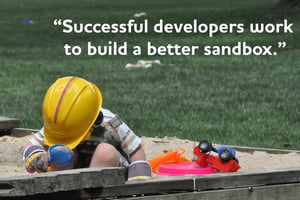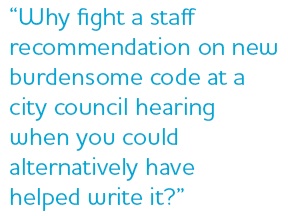 I once knew a fisherman and developer named Don. He found a community he wanted to both work in and live in, a place filled with natural beauty, plentiful water, great fundamentals for growth, and great fishing of course.
I once knew a fisherman and developer named Don. He found a community he wanted to both work in and live in, a place filled with natural beauty, plentiful water, great fundamentals for growth, and great fishing of course.
Don forecast the long-term potential of the region to attract and retain industries that grow jobs and accommodate well-planned residential development. He assessed the existing infrastructure and its capacity for expansion, and he looked for ample inventory of land suitable for the type of development he wanted to do. He researched how hard it was to get projects approved, and again he made damn sure the fishing was good too. To be candid, I’m fairly certain his priorities were not necessarily in that order.
Don committed. He moved to this new area and bought lots of land. He had vision. He was going to do it right. But he knew he had much work to do beyond locking up the real estate and getting a new boat. He had to work on a long-term strategy to help the agencies prepare for and improve at reviewing and approving land development. He knew from decades of experience in California that building great communities was a partnership with the jurisdiction and sometimes they needed help to better prepare for future growth and to be the best partner. He’d seen it go badly in the past, but he had a plan for making things better in the future.
You’ve probably felt like Don on your own scale or maybe wanted to be like Don. Who wouldn’t want to move somewhere new with a blank canvas for development where you could “do it right this time” and have ample fishing opportunities to distract you?
I am not a fisherman, but we can all relate to chasing that perfect lifestyle balance. Developers are optimists and we don’t want to choose between quality of life and quality of our work. We want it all in one sandbox. And what do successful developers do when they find themselves in the wrong sandbox? They either fix it or go somewhere else and build a new one!
Trait #5: Successful developers work to build a better sandbox
In an ideal world, developers find great dirt in a great place and the agencies are great to work with, are development friendly, and have a sustainable approach to providing the properly zoned ground and the necessary backbone public infrastructure to support continued development. Consistent development success also pivots on the agency’s vision, purpose, fairness, and permit predictability. Well, Utopia City doesn’t exist.
As I said in my prior blog post, successful developers understand that no matter how good the dirt is, the quality of the jurisdiction that reviews and approves their project is just as important. In some cases, the development atmosphere with the agency may be poor or unsettled enough that you have to choose to walk away, even if you love the property.
But another option that successful developers often choose is to help build a better sandbox where the dirt is good but the agency needs help. This involves working hard over time to partner with agencies to get there. In the long-term game this necessitates a holistic approach that can include the following:
- Working to influence growth boundaries
- Sitting on planning commissions to influence zoning decisions and permitting codes
- Lobbying to raise the standards of development if higher quality is your market
- Helping chambers of commerce and economic development councils advocate for a competitive business climate
- Joining homebuilder and contractor associations that work to keep impact fees and development review timelines reasonable.
Other less obvious ways to help shape an agency’s development review posture for the better and build credibility can be through activism and volunteerism at the agency. Here are some examples:
- Offering to serve on agency management hiring panels as an objective outsider’s voice. Being part of the panel that hired the next director of community development or city engineer can help ensure the right person gets the job, but also makes you one of their first developer relationships as they start the new job.
- Be a voice of reason. Attend council and commission hearings when you don’t have a project on the agenda. Most people attend when they oppose an item or it is their item. Being on the record as supportive of new regulations that are reasonable, even to advocate for other developer projects, and supporting tough policy or budget decisions when it does make sense will put you in a position of influence with the agency over time.
- Being willing to sit on ordinance writing task forces to help write new code.
- Agreeing to serve on design review boards and architectural review committees that review proposals and review new code.

Agencies are often thirsty to include this private sector credibility in their process improvements and new regulations. Why fight a staff recommendation on new burdensome code at a city council hearing when you could alternatively have helped write it? The other side benefit of this kind of agency activism is seeing change coming before the broader market does. If you know a new building fire code is coming or that a new stormwater standard is imminent, you can adapt faster.
In response to more short-term agency problems, these long-term efforts and memberships are currency with the agencies. They show you are a developer “with skin in the game” and garner you the credibility that is essential to convince staff to course correct an impending new regulation with unintended consequences or to choose to publicly fund a failing interchange or arterial instead of burdening you with the heavy lift.
In my experience, those jurisdictions that conduct development review the best most often have a strong relationship with a well-intentioned development community that continues to partner in developing the latest best practices in regulations, building codes, hiring, capital facilities planning and financing, predictable and impartial entitlement processes, and fair impact fees.
In summary, the great developers don’t charge blindly into development. They research the agency in addition to the dirt, and if they uncover issues with the agency they make an informed decision about whether to walk away or work with the agency to build a better sandbox. Those who choose the latter aren’t trying to fight city hall. Instead, they work from inside the walls to help avoid fights and help the city be a place where quality development blooms and robust private investment perpetuates beyond a single hit and run deal.
Don, the fisherman who loved land development, helped establish more than a 30-year run of successful development projects including industrial, housing, commercial, new freeways, parks, and a thriving community that I live in to this day. Don doesn’t get all the credit, but his strategy of working with the agencies laid the foundation for many to succeed.
Do you partner with agencies to improve the development climate where you work? What tips do you have that may help others succeed? Please leave a comment to get the conversation started.
Read the entire Eight Traits of Successful Developers Series HERE.
Photo credit: © Can Stock Photo Inc. / refocusphoto


Leave us a comment below